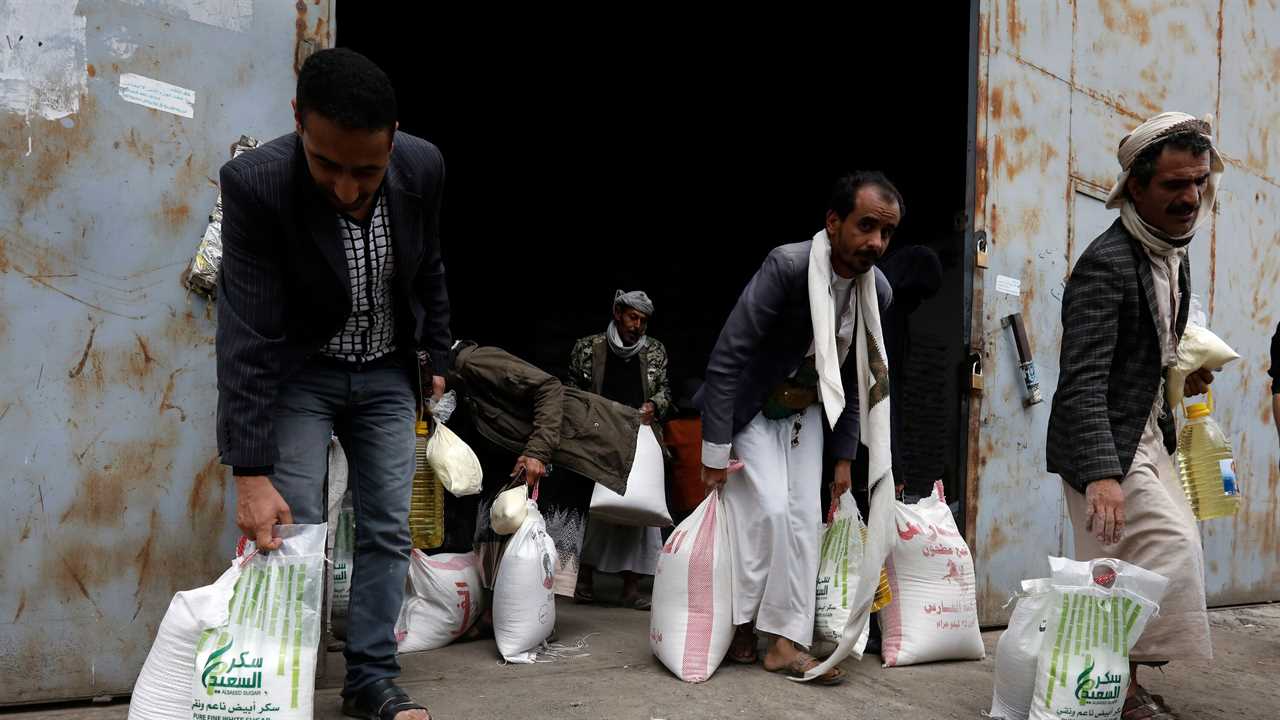
WASHINGTON — The Trump administration’s rush to declare Houthi rebels in Yemen a terrorist organization leaves humanitarian aid workers and commercial importers vulnerable to criminal penalties, officials said Monday, risking future shipments of food, medical supplies and other assistance to the impoverished country.
Secretary of State Mike Pompeo, who announced the terrorism designation late Sunday, said officials were “planning to put in place measures” to ensure that the aid continued.
But that failed to assure a number of lawmakers, diplomats and aid groups who accused the administration of rushing to issue the policy before President Trump leaves office next week, and said clear-cut legal protections should have been enacted in tandem with the terrorism designation to prevent another barrier to assisting one of the world’s poorest states.
The terrorism designation “makes it harder to deliver lifesaving assistance in a country already experiencing the worst humanitarian crisis in the world,” said Representative Gregory W. Meeks, a New York Democrat who is chairman of the House Foreign Affairs Committee.
“People will suffer and die, and those deaths are entirely preventable,” Mr. Meeks said.
The terrorism designation, which Secretary of State Mike Pompeo announced late Sunday and takes effect Jan. 19, imposes new economic and travel sanctions on Houthi rebels who overthrew the Yemeni government six years ago and have been fighting a war against Saudi Arabia since 2015.
It largely aims to hobble Iran, the Houthis’ main benefactor, by discouraging weapons, supplies and other support that Tehran has been sending to the rebel movement as part of a Middle East proxy war.
Mr. Pompeo said the action sought “to advance efforts to achieve a peaceful, sovereign and united Yemen that is both free from Iranian interference and at peace with its neighbors.”
He also noted concerns that the designation would limit aid to desperate Yemenis, but said if the Houthis “did not behave like a terrorist organization, we would not designate it.”
That did little to assure aid workers and other commercial importers who demanded clarification on seemingly contradictory standards of liability.
“It is hard to imagine that in the last days of the Trump administration, a bolt of lightning is going to hit them and they are suddenly going to figure how hot to keep these designations from taking an agonizing toll on Yemen’s civilians,” said Scott Paul, the humanitarian policy lead for Oxfam America. “We can’t count on that happening.”
Congressional aides voiced similar concerns after being briefed on Monday by officials from the State Department and the U.S. Agency for International Development.
The Houthis, who call themselves Ansar Allah, or the Partisans of God, are the de facto government in a swath of territory where the majority of Yemen’s population lives, including the capital city, Sana, and the country’s biggest port.
Saudi Arabia and a number of Arab allies, which have pushed for the terrorism designation, have failed to restore the internationally recognized government as the war in Yemen has settled into a quagmire, birthing what United Nations officials have called the world’s worst humanitarian crisis.
Millions of Yemenis rely on government institutions the Houthis control to receive basic goods. Ships bringing food must pay port fees at a Houthi-controlled port, and Western charities support teachers and health care workers who work for Houthi-controlled administrations, whether they support the group or not.
Mr. Pompeo pointed to a Dec. 30 attack on the civilian airport in the Yemeni city of Aden, killing 27 people, as evidence of the Houthis’ capability for terror. No one has claimed responsibility for that attack, and both Al Qaeda and the Islamic State are both active in the area.
Many analysts believe the Houthis pose no direct threat to the United States, and have voiced skepticism that the sanctions will pressure the Houthis to negotiate an end to the war. The United States has supported the Saudi effort in the war, which has killed thousands of civilians in Yemen.
Mohammed Ali al-Houthi, a senior member of the Houthi movement, scoffed on Monday at the designation that he said would result “in killing and spreading hunger.”
A spokesman for the incoming administration of President-elect Joseph R. Biden Jr. did not rule out reversing the designation after Mr. Trump leaves office on Jan. 20.
Even diplomats who say the Houthis do not qualify as a terrorist organization, and objected to the designation, recognize that “they are certainly an odious group,” said Gerald M. Feierstein, the ambassador to Yemen during the Obama administration.
“So how do you remove the F.T.O. designation without suggesting that you sympathize with them or hold them blameless for the catastrophe in Yemen?” said Mr. Feierstein, now with the Middle East Institute in Washington. “It won’t be easy.”
Lara Jakes reported from Washington, and Ben Hubbard from Beirut, Lebanon. Edward Wong contributed reporting.






